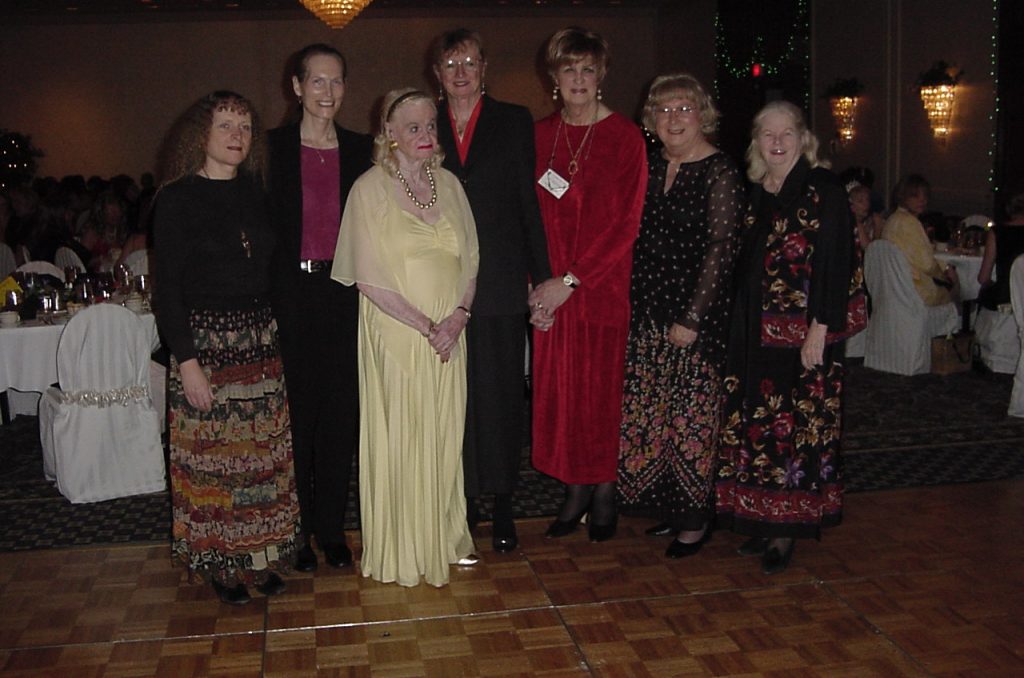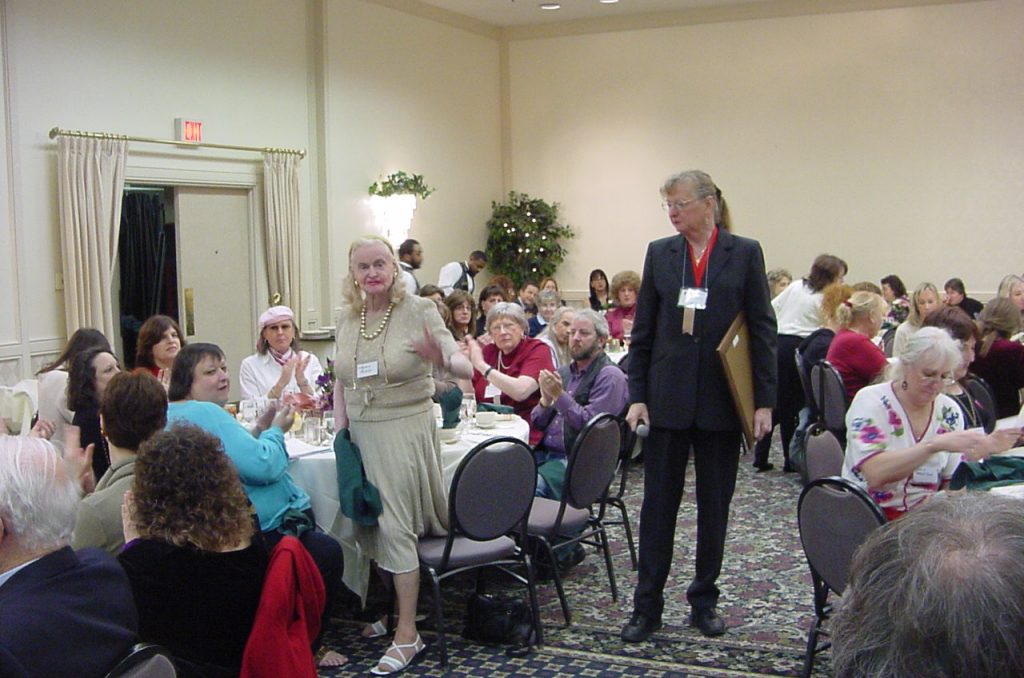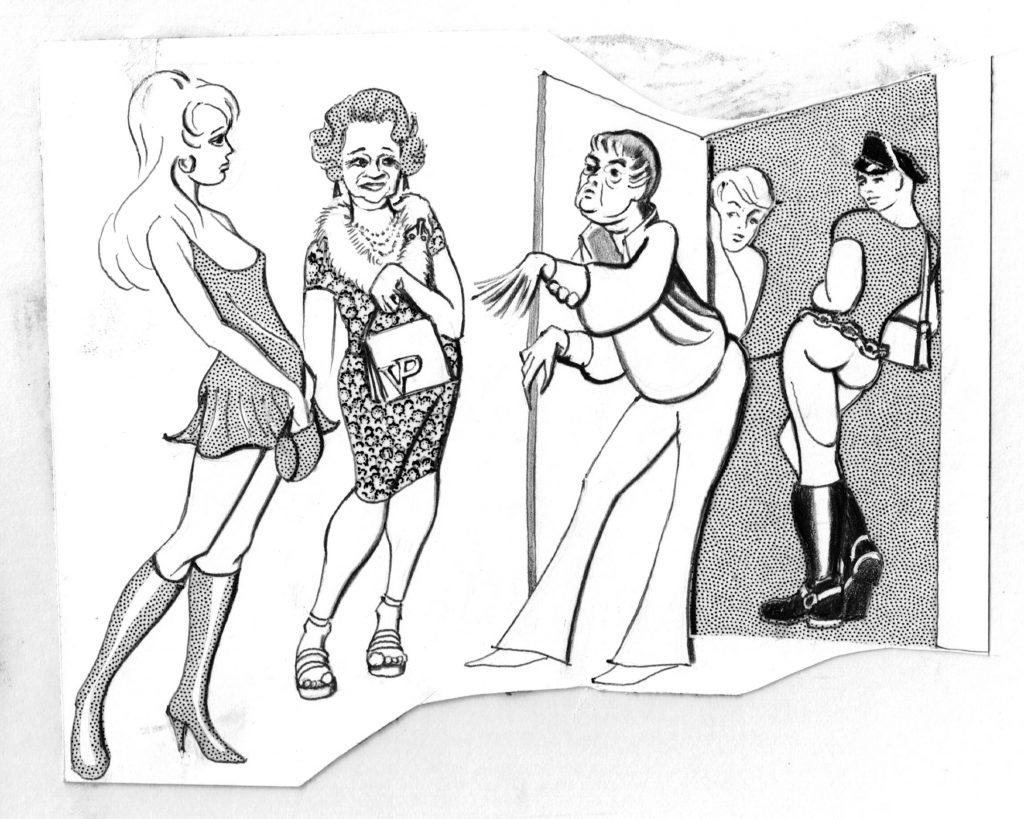Remembering Virginia Prince
I wrote the following — but didn’t finish it — a few years before Virginia Prince’s death in 2009 at age 96. Four years after her death, I am finally able to complete it.
Virginia Prince was many things. She was a chemist and an entrepreneur. She was a full-time crossdresser.
Virginia lived the last four decades of her life as a woman, but denied being transsexual. She was the publisher of the legendary crossdressing magazine Transvestia and the author of three books, many essays, and a dozen or so peer-reviewed scientific publications about crossdressing (most co-authored with Peter Bentler). She founded more than a few social and support groups for crossdressers and traveled the world promoting them and her philosophy of heterosexual crossdressing.
And she was a felon.
Some words of explanation about the first and second paragraphs: Virginia once told me she had looked into surgical sex reassignment options after her transition. Surgery frightened her and she decided it wasn’t for her. Biographies don’t mention this, so I thought I would put it on the record.
Virginia’s felonious act was to send an amorous letter to another crossdresser at a time when the U.S. Post Office had taken it upon itself to criminalize correspondence about homosexuality. The postal inspectors who arrested Virginia made no distinction between heterosexual crossdressing and homosexuality. Virginia always claimed she thought her correspondent was a female, but I rather didn’t believe her when she told me that, and I don’t quite believe it now. Thus, the correspondence was in a way homosexual in nature — not that what two consenting adults wrote to one another was any of the post office’s business.
Virginia was a quarrelsome person, and a bigoted one. She objectified women, aggressively excluded transsexuals and gay men from Tri-Ess and her other organizations, and in general forced her opinions on everyone; in earlier decades those who refused to agree were cast from her fold. Case in point: after she decided surgery wasn’t for her she thought no one should have it. She wrote and said objectionable and sometimes horrible things about transsexuals, right into the last years of the twentieth century. Consequently, even after her death, many transsexuals loathe her.
I despised Virginia for her sexism and homophobia and transphobia and tried many times to convince her to open the membership of Tri-Ess to anyone who supported its goal of supporting heterosexual crossdressers. So did any number of other people. Being Virginia, of course, she never budged. Over the decades of her dominance of the crossdressing community, many people who were looking for support were turned or driven away because of her prejudices. History will not remember kindly for this — nor should it.
And yet I grudgingly admired Virginia — not for her politics, but for her courage. After she was led away from the chemical factory she owned in handcuffs, postal inspectors offered to release her on condition she stop publishing Transvestia. Although circulation probably never reached more than one thousand copies, she refused, knowing her refusal to capitulate meant she would be convicted and perhaps sent to prison. That’s courage.
I admired Virginia for her kindness, also. She gave away much of her fortune to hard-case crossdressers, some of whom bilked her for everything they could. Because of that, I made sure she would be the first recipient of Real Life Experiences’ Transgender Pioneer Award, which came in her case with a check with a two, a five, and two zeroes. She was on a fixed income, and the money was a boon to her in her declining years. Real Life Experiences, in case you don’t know, is the nonprofit that runs Fantasia Fair. Virginia attended many Fantasia Fairs.
And finally, I admired Virginia for her persistence. She was not a brief candle. For more than fifty years she did her best to make things better for heterosexual crossdressers. She remained true to that vision. Yes, she harmed the community she helped to start, yes, she was a flawed and sometimes nasty human being, but she remained loyal to her principles, skewed though they might have been. In an age when activists arise, burn brightly, and disappear within five or ten years, a career spanning more than half a century remains a remarkable achievement.
Virginia deserves recognition for what she did — the good and the bad.
Virginia Prince was a hard person to forget, so naturally my memories of her are crystal clear. Here, for what it’s worth, are my recollections from the nearly twenty years of our acquaintance.
Remembering Virginia Prince
By Dallas Denny
I first met Virginia Prince in 1980, by way of a letter I sent to Tri-Ess, The Society for the Second Self, an organization for heterosexual crossdressers. I identified myself as transsexual and asked for her support. I kept the two letters she sent me, telling me in no uncertain terms I could never be female. The originals now reside at the Labadie Collection at the University of Michigan’s library system.

Virginia Prince Award Winners, IFGE Conference, 2004. LTR: Holly Boswell, Marsha Botzer, Virginia, Yvonne Cook, Sheila Kirk, Alison and Dottie Laing.
IFGE Conference, Houston, 1992. I’m sitting beside Virginia on the hotel van, which is taking us and others to a restaurant. As we catch up with one another, I tell Virginia my transsexualism has helped me rediscover my spirituality.
In her trademark raspy voice, she says, “Define spirituality.”
That’s the Virginia I knew, argued against, and, I have to admit, at some levels admired.
Virginia’s remark reminded me of something B.F. Skinner said in a speech at the Association for Behavior Analysis conference in Chicago, back in 1977. I was lucky enough to be in the audience. “When I’m reading a book,” he said, “and I come to a description of a dream, I skip it.”
Like Skinner, Virginia believed in the observable. She held no cotton with things she couldn’t observe or define. Her thinking was rigid and linear. It was scientific thinking, although entirely deductive. She was utterly unable to re-examine or modify her hypotheses.

Yvonne Cook-Riley, at right, at the 2004 Virginia Prince Award Ceremony. Virginia is standing to Yvonne’s left. That’s me in the aqua sweater.
Fantasia Fair, Provincetown, early 2000s. It’s a stormy October night in Provincetown. I happen to be standing near the front door of the Pilgrim House when the aged Virginia, hurrying to get out of the rain, trips over the transom and heads helter-skelter towards the floor. I’m perfectly positioned to catch her, and I do.
“We have to stop meeting like this,” she tells me.
Two days later she trips and falls on the stairway at the Pilgrim House. Alison Laing is right behind her, but is unable to reach her in time. Fortunately, Virginia isn’t hurt. She looks up to me and said, “So, where were you?”
Texas “T” Party, San Antonio, mid 1990s. I’m in the hotel lobby, waiting for the doors to open for the Saturday night banquet and dance. In front of at least a hundred people, Virginia is arguing with a woman who she had taken on a cruise, demanding the woman reimburse her for the ticket she had bought for her because there had been no sex. “It was my understanding that we would have sex,” Virginia says. “It was quid pro quo. We didn’t have sex, and so you have to give me the money back.”
The woman, of course, says what almost any woman would say under the circumstances: “That certainly wasn’t MY understanding.”
Virginia, being Virginia, just won’t give it up. When the doors finally open to admit us to the banquet hall, she’s still at it.
I first became aware of Virginia’s misogyny in 1991, when I read her book The Transvestite and His Wife. In it, she introduces a rating system for wives. When I told her how horrid her A-wife to F-wife grading system was, she defended it. I don’t think she was capable of imagining how sexist it was.
I spoke with IFGE Executive Director Merissa Sherrill Lynn, asking her to remove the book from IFGE’s bookstore because it was an affront to women, but I don’t think she got it either. The book remained on sale.
The argument at the T Party sticks in my mind as the most misogynistic thing I have ever seen. That it came from someone who had been living as a woman for forty years was and remains absolutely astonishing.
From conversations with Virginia over the years, I became aware that she identified with other crossdressers, but rarely or never with women. This disabused me of my earliest ideas about her, which was that she was a chickenshit transsexual. I can say now with some authority Virginia is the polar opposite of most male-to-female transsexuals.
Virginia was an astonishingly officious person. At the IFGE conference in Houston I watched her interrupt a sweet grass smudging by the late Rena Swifthawk to speculate about whether the heat would set off the sprinklers. It ruined the yes, spiritual, moment.
A few years later, at one or another T-Party, there was a false fire alarm. Virginia cornered the nearest hotel employee — he happened to be a bellman — and lectured him for a half hour on the proper operation of alarm systems. Throughout, he looked like a deer caught in headlights.
Fantasia Fair, Provincetown, early 1990s. I am asked to share a room with Virginia for a week. Understanding it will be a difficult week, I agree.
On the first night we begin a discussion that is to last through the entire week. She is arguing for the biological binary of human sex, and I’m arguing for relativism. The point on which we stick is this: in a society which differentiates male from female not on the basis of genitalia or chromosomes, but upon gender identity, is maleness and femaleness different than in our society? I say yes. Virginia says no. There are penises and vaginas, and they are entirely different.
“What,” I ask, “about a society that doesn’t define maleness and femaleness by penises and vaginas. What if the society classifies tall people as male and short people as female?”
That throws her. She grapples with what I have said, and clearly has difficulty fitting it into her cosmology of gender. For a week she circles the idea, all the while traveling in a straight line. It’s rather like circling the universe linearly. On the last day of the Fair she concedes I might have a point — but the next time we talk she has conveniently forgotten the conversation.
Atlanta Hartsfield-Jackson Airport, late 1990s. I’m on a plane, headed for an IFGE conference in Chicago, when who should walk up the aisle, assisted by a flight attendant, but Virginia Prince. We arrange to be seated together and talk throughout the flight.
Atlanta, late 1990s. I get a phone call from Virginia. She tells me she’s in town and would like to meet with me. We go out for supper and discuss the latest issue of my journal Chrysalis, in which I had posed some very difficult questions abut heterosexual crossdressing, and about which Tri-Ess leader Mary Ellen Fairfax had taken great offense. Virginia wanted to patch things up. We affirm our mutual respect for one another, but are just unable to agree on the issue. I later learn she had taken special pains to make it to Atlanta to talk to me.
Fantasia Fair, Provincetown, very early 1990s. Virginia shows up at the Tuesday masquerade in a corset with her 88-year-old breasts outthrust, defying gravity, pushed up nearly to her chin and bare almost to the nipples. With her bosom just inches away from a mouth that is gaudily overpainted with crimson lipstick, she is an astonishing sight. Later, Virginia tells me being a chemist was handy; she cooked up some estrogens and took them until the girls (her term) had grown to full size. “I’ve not taken estrogen since,” she says.
Late 1990s. Virginia phones me to thank me for a Tapestry editorial in which I criticized S.P.I.C.E., the Tri-Ess-sponsored spouse’s conference, for requiring her to dress as a man in order to give a speech. Virginia tells me she endured the humiliation because she had something important to say to those wives — which was that she had been living as a woman for more years than most of them!
Mid 2000s. I phone Virginia, as I do every year or two, to see how she’s getting on in her assisted care facility. Well, she says. She enjoying the company of the women in her facility. She’s still concerned lest she be found out. Although she has a reverse mortgage on her house to supplement her other income, money is tight, but she still takes college classes. She tells me her theory of cosmology. Her book on the subject is apparently finished and she’s looking for a publisher.
After I hang up, I wonder, as I always do, what will happen when, after her death, she is discovered to have male genitalia. I hope she expires in a hospital rather than in the facility.
Mid-1990s, mid-October. Fantasia Fair is ongoing. I’m hard at work as a member of the conference committee when I get a telephone conference. It’s Anne Lawrence. She’s outraged that, in an essay in Kimberleigh Richards’ CrossTalk magazine, Virginia described transsexuals as “a sort of human.” Anne asks for my support in her drive to persuade IFGE to rename their highest award, the Virginia Prince Award for Lifetime Achievement.
I tell Anne I agree IFGE should rename the award, but tell her I won’t be signing on for the fight. Virginia’s remark was, at bottom rude and insensitive, but not a deliberate assault on transsexuals (those occurred elsewhere). IFGE, I warn Anne, won’t get it.
A few years later, Anne, like Virginia before her, is doing her best to cram her own particular solution to her gender issues down everyone else’s throats.
A few years after that, I am given the very last Virginia Prince award.
No, IFGE didn’t understand it was an unfortunately-named recognition. They were just running out of steam.
Today, four years after Virginia Prince’s death [Editor’s Note: 6 years now in 2015.], I continue to simultaneously admire and despise her. I have to say, though — if I had known her in her argumentative, autocratic prime, my feelings might today be more one-sided.
Which they in fact were forty-five years ago, when Virginia responded to my request for help with a lecture.
© 2013 by Dallas Denny
This article appeared originally on the Chrysalis website. It is re-published here with permission.
Category: Transgender History, Transgender Opinion




